Glendale Mill
Office Robbery
$18,000
Taken
Story furnished by
Clarence Crocker
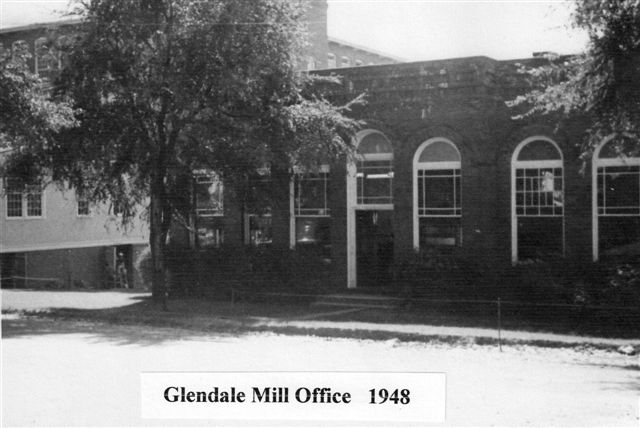
As had been the custom
for many years, the mill Superintendent went to the mill
office early on Friday morning, February 27, 1948 to
make arrangements to pay the first and second shift
workers. The money had been brought from the Citizens
and Southern National Bank in Spartanburg and had been
prepared in small sealed manila envelopes, placed in
small trays according to departments and placed in the
company safe by the Paymaster on the evening of the
26th.
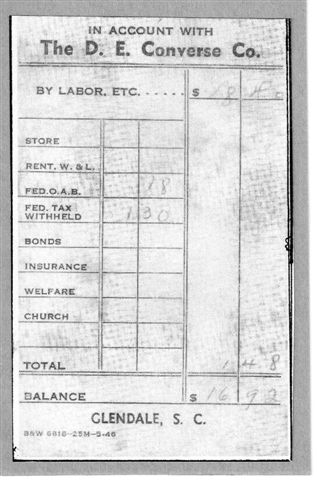
Pay Envelope
The employee’s name
and total amount of earnings were written on the front
of every envelope along with the applicable deductions
such as house rent, tax, S.S., insurance, company store
charges, church contributions, charity, etc. Small
bills, none over twenty dollars and change were used to
pay the employees.
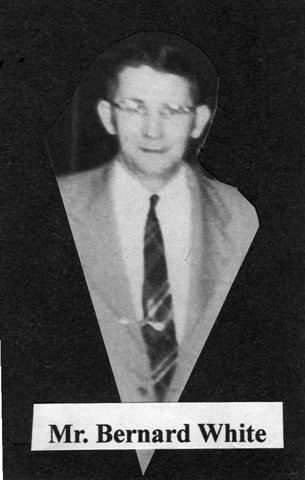
This particular Friday
morning was different from all others. When Bernard
White, Mill Superintendent arrived at the office, he
found the safe open and the money missing. Sometime
Thursday night, February 26, or early Friday morning,
the 27th, a thief or thieves had entered the office,
knocked the safe combination knob off, punched out the
mechanism and ripped the door open and had taken all the
money.
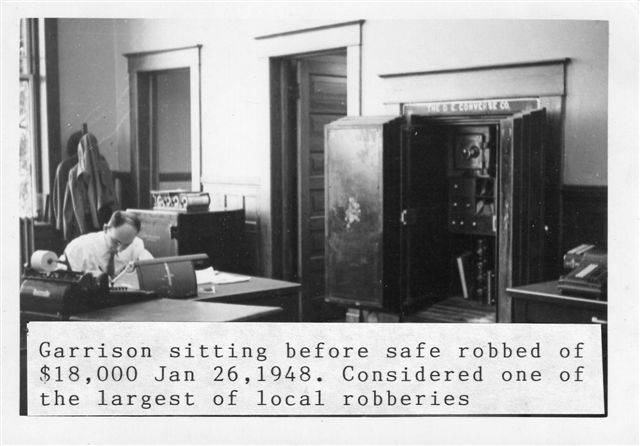
The Spartanburg County
Sheriff, B. B. Brockman was notified. He, county
Detectives George Pruette and Jess Murph came
immediately to the mill office. Will Quinn, mill and
village policeman, was there also.
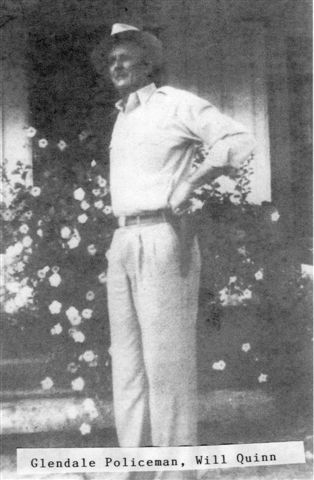 (Mr. Quinn)
(Mr. Quinn)
In an article written
by Mike Guthrie and printed in the Spartanburg Herald on
Saturday, February 28, 1948, it was stated that the
trays of money had been loaded in a wastebasket taken
from the office to cart away the loot. Merchants were
asked to be on the look-out for persons with unusual
amounts of small denomination bills.
It was the opinion of
all concerned parties that the robbery had been well
planned and executed perhaps by several persons having
at least one car. The mill night watchman had made his
regular rounds punching the time clocks and had seen
nothing unusual. The Sheriff suggested that it would
have taken only a few minutes for an experienced robber
to do the entire job.
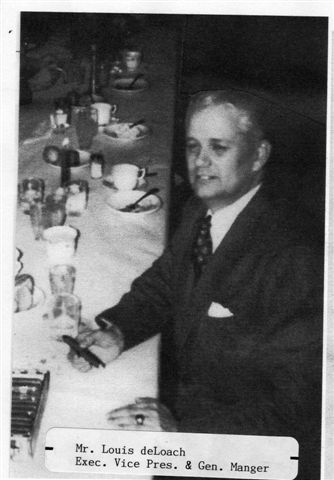
Mr. L. D. DeLoach,
Executive Vice President and General Manager of Glendale
Mills, also felt that the robber or robbers got in
quickly, worked fast and got out fast. It was his
opinion that it was the work of a professional safe
cracker expert or experts.
Since evidence of a
recent robbery at the Saxon Mill Store and the
Fingerville Mill plant as well as others in North
Carolina and Georgia showed that there might be a
connection, the Federal Bureau of Investigation, The
Treasury Department Agents, The North Carolina State
Police along with the Spartanburg Sheriff’s office
joined in the investigation. At that time the robbery
was considered to be among the largest in local history.
Bulletins concerning the robberies were circulated
throughout the southern states. After a suspect had been
identified and Police were advised that he had lived and
worked in Glendale, the house in which it was said that
he had lived was immediately put under surveillance.
Incidentally, the house was within sight of the mill
office.
Having been advised
that Tennessee police were holding the suspect, Sheriff
B. B. Brockman, County Police Chief, O. L. Brady, State
Constable J. Marion Langston and a Postal Inspector went
to Kingsport, Tennessee on Monday afternoon April 5. On
Tuesday afternoon April 6, 1948, Sheriff Brockman, while
still in Tennessee, announced to the Spartanburg Journal
through Detective George Pruette in Spartanburg that a
suspect, Claude Manis alias Hugh G Manis, had been
arrested and charged with the robbery at Glendale Mills
and the Saxon Mill Store. He stated that two warrants
had been signed before Magistrate Esten C. Taylor and
served on Manis who was being held in the Tennessee
jail.
The Newspaper account
written by Glen W. Naves stated that the first warrant
charged him with taking $18,000.00, more or less, from
Glendale Mills. The Second warrant charged him with
taking $2200.00 more or less, from the Saxon Mill Store.
Detective Pruette stated that officers had been informed
that Manis had lived in Spartanburg county for some time
and had lived in Glendale, working in the mill for a
short while.
Shortly after the
robbery, the company began to pay the employees by check
as opposed to cash. Arrangement was made at the Glendale
Mill Store to cash the employee’s check when requested.
Cash was brought from the bank on Friday and Saturday
mornings by armed guards for this express purpose.
According to court
records, copies (19 pages) of which I have at hand,
indicate that Manis appeared in the Spartanburg General
Session Court which convened on the fourth Monday of
July 1948 where he was charged in the Glendale Case with
three indictments; Housebreaking, Larceny and Receiving
stolen goods. A panel of twenty seven jurors was drawn
of which five were excused by the State and ten were
excused by the Defendant. Sheriff B.B. Brockman
presented the case against the defendant as he had found
it along with the testimony of Mr. T. M. Howe and his
wife, Mrs. Annie Howe, employees of Glendale Mills. They
testified that they saw a man parked near the office
about 10;20 the night of the robbery and identified
Manis from a photo which was shown to them. They later
testified that he was the same man they saw the night of
the robbery when confronted by him after his
arrest.
He was found guilty by
the jury on the first and second counts and not guilty
on the third count. Signed by C. M. Pearson, Foreman.
The judgment of the court read; “The sentence of the
Court is that you, Claude Manis alias Hugh S. Manis be
confined upon the public works of Spartanburg County or
in the State Penitentiary at hard labor for a period of
fifteen years.” Signed by T. S. Sease , Presiding Judges
July 29, 1948.
The lawyers for the
defendant, Attorneys Sam M. Burts, C. Yates Brown and
Thomas Whiteside moved that the Judge give a directed
“Not Guilty” verdict on all accounts but was denied.
They then made the motion for a new trial which was also
denied. Notice of intention to appeal to the State
Supreme Court was filed immediately with Samuel R. Watt,
Solicitor of the 7th Judicial Circuit, consenting.
A six page appeal was
filed January 12, 1949 before the S.C. Supreme Court by
the aforesaid attorneys for Claude Manis alias Hugh S.
Manis . Pointing out that the respondent has relied
entirely on circumstantial evidence and while crediting
the testimony of Mr. and Mrs. Howe with all sincerity
was “dubious” at best. It was suggested that the word of
a $500 reward might have influenced them in that they
did not notify anyone of their sighting for some time
after the robbery. After strong emphasis on the lack of
“proof” the judgment of the Supreme Court was; “the
judgment of the lower court is reversed and the case
remanded for entry of judgment for the appellant; and
unless there are other charges pending against him, it
is ordered that he be discharged from custody. Copy of
judgment filed by E. W. Miller, Clerk of Court,
Spartanburg County, January 24, 1949.
Unfortunately for
Manis another warrant had been filed in Spartanburg
County against him on a like charge which was pending
trial preventing his release. On January 24, 1949, same
day as the Supreme Courts judgment, C. Yates Brown, the
Attorney for Manis, filed motion before the Spartanburg
General Sessions court that Manis be granted bail. The
court ordered that he be released from custody under
bail of fifteen hundred, ($1500.00) This writer having
no further interest in the case against Manis sought no
further information regarding the defendant.
Footnote;
Following
the fire which destroyed the Mill Plant and all outer
buildings except the Mill Office, the Mill Office and
other property was donated by the owner to Wofford
College, Spartanburg, S. C. They have done a magnificent
work of restoration of the building and preservation of
the grounds. This writer would like to commend and
express appreciation for their help in making Glendale a
point of interest once again.
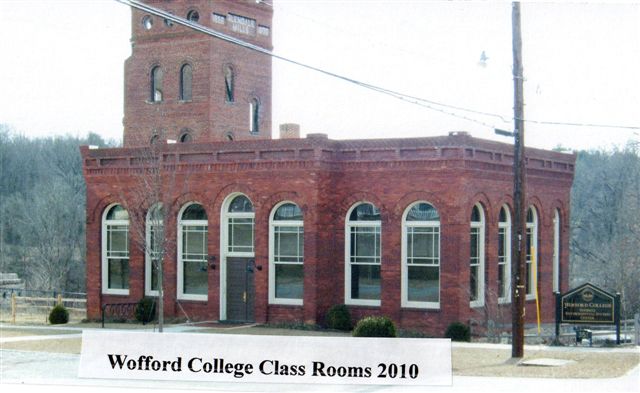

This web site has been started as a
public service to share the story of Glendale.
See more information about Mary and her Glendale
connection at Mary McKinney
Teaster.


(Mr. Quinn)




